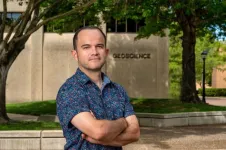(Press-News.org) (Thursday, 12 October 2023, Berlin, Germany) Skin cancer detection using artificial intelligence (AI) software has rapidly improved, new research has shown, with the latest software reaching a 100% detection rate for melanoma.1
The study, presented today at the European Academy of Dermatology and Venereology (EADV) Congress 2023, assessed 22,356 patients with suspected skin cancers over a 2.5-year period.1
As well as a 100% (59/59 cases identified) sensitivity for detecting melanoma - the most serious form of skin cancer2 - the new software correctly detected 99.5% (189/190) of all skin cancers and 92.5% (541/585) of pre-cancerous lesions.1
The third version of the AI software* marks a significant improvement from the first model, tested in 2021, which detected 85.9% (195/227) of melanoma, 83.8% (903/1078) of all skin cancers and 54.1% (496/917) of pre-cancerous lesions.1
Lead author Dr Kashini Andrew, Specialist Registrar at University Hospitals Birmingham NHS Foundation Trust, comments, "This study has demonstrated how AI is rapidly improving and learning, with the high accuracy directly attributable to improvements in AI training techniques and the quality of data used to train the AI. The latest version of the software has saved over 1,000 face-to-face consultations in the secondary care setting between April 2022 and January 2023,3 freeing up more time for patients that need urgent attention."
Whilst the data is incredibly encouraging, the research team note that AI should not be used as a standalone detection tool without the support of a Consultant Dermatologist. Of the basal cell carcinoma cases, a single case was missed out of 190, which was later identified at a second read by a dermatologist 'safety net'.2 This further demonstrates the need to have appropriate clinical oversight of the AI.
The co-author, Dr Irshad Zaki, Consultant Dermatologist at University Hospitals Birmingham NHS Foundation Trust, also explains. "We would like to stress that AI should not be used as a standalone tool in skin cancer detection and that AI is not a substitute for Consultant Dermatologists."
"The role of AI in dermatology and the most appropriate pathway are debated,” says Dr Andrew. “Further research with appropriate clinical oversight may allow the deployment of AI as a triage tool. However, any pathway must demonstrate cost-effectiveness, and AI is currently not a stand-alone tool in dermatology. Our data shows the great promise of AI in future provision of healthcare."
END
Note to editors:
A reference to the EADV Congress 2023 must be included in all coverage and/or articles associated with this study.
For more information or to arrange an expert interview, please contact Phoebe May at phoebe.may@emotiveagency.com or press@eadv.org.
*Table 1: AI Performance by Version % (n/N), Confidence intervals in square brackets:1
AI Version 1 (20 Apr 2020 to 14 Jul 2021)
AI Version 2 (15 Jul 2021 to 21 Apr 2022)
AI Version 3 (22 Apr 2022 to 5 Jan 2023)
Melanoma sensitivity
85.9%
(195/227)
[80.8-89.8%]
97.1%
(135/139)
[92.8-98.9%]
100%
(59/59)
[93.9-100%]
All skin cancer sensitivity
83.8%
(903/1078)
[81.4-85.8%]
98.5%
(743/754)
[97.4-99.2%]
99.5%
(189/190)*
[97.1-99.9%]
Pre-malignant sensitivity
54.1%
(496/917)
[50.9-57.3%]
94.0%
(736/783)
[92.1-95.5%]
92.5%
(541/585)
[90.1-94.3%]
Benign lesion specificity
79.7%
(2879/3614)
[78.3-80.9%]
49.4%
(1408/2853)
[47.5-51.2%]
75.3%
(1856/2465)
[73.6-77%]
*1x basal cell carcinoma diagnosis as benign
About the study author:
Dr Kashini Andrew is a Specialist Registrar at University Hospitals Birmingham NHS Foundation Trust, Birmingham, UK.
About the study co-author:
Dr Irshad Zaki is a Consultant Dermatologist at University Hospitals Birmingham NHS Foundation Trust, Birmingham, UK.
About EADV:
Founded in 1987, EADV is a non-profit organisation with a vision to form a premier European Dermatology-Venereology Society. The Academy counts over 9000 members from 120 countries, providing a valuable service for every type of dermatologist-venereologist professional. The EADV is dedicated to advancing patient care, education and research by providing a unique platform to bring people together and share ideas.
This year, the EADV Congress will take place in Berlin, Germany, and online from
11–14 October 2023.
Find out more via the EADV website: https://www.eadv.org/
References:
Andrew, K et al. Continued Improvement of Artificial Intelligence in Identifying Skin Cancer (e-poster). Presented at the EADV Congress 2023; 12 October 2023; Berlin, Germany.
NHS. Overview: Skin cancer (non-melanoma). (Last updated January 2020). Available at: https://www.nhs.uk/conditions/non-melanoma-skin-cancer/ (Accessed: September 2023).
Andrew, K et al. Continued Improvement of Artificial Intelligence in Identifying Skin Cancer (abstract). Presented at the EADV Congress 2023; 12 October 2023; Berlin, Germany.
END
Human milk is known to provide numerous health benefits to infants, including lower risks of infection, childhood obesity, allergies and autoimmune diseases, which is why the American Academy of Pediatrics and the World Health Organization recommend exclusive breastfeeding for the first six months of life.
Yet some 60% of new parents struggle to meet their breast-feeding goals, and an inadequate milk supply is the most frequent reason given for earlier-than-desired weaning.
A team of breast cancer-breast ...
As California works to meet climate and air quality goals, a key to the transition will come from biomass, which is renewable organic material from plants and animals.
New research from the University of California, Davis, published in the journal Global Change Biology Bioenergy, examines the good and bad uses of biomass and the best pathways to meet California’s goal of reducing carbon dioxide emissions by 85% of 1990 levels by 2045.
“California is fortunate in having a large biomass resource,” said lead author Peter Freer-Smith, an adjunct professor in the Department of Plant Sciences. “Finding ...
Filaments of dust and gas festoon this star-forming region in a new infrared image from MIRI.
One of the greatest strengths of NASA’s James Webb Space Telescope is its ability to give astronomers detailed views of areas where new stars are being born. The latest example, showcased here in a new image from Webb’s Mid-Infrared Instrument (MIRI), is NGC 346 – the brightest and largest star-forming region in the Small Magellanic Cloud.
The Small Magellanic Cloud (SMC) is a satellite galaxy of the Milky Way, visible to the unaided eye in the southern constellation Tucana. This ...
The National Cancer Institute awarded investigators at Huntsman Cancer Institute a grant totaling more than $3 million to conduct a clinical trial to see if combining creatine monohydrate supplementation and resistance exercise training helps preserve muscle in people who have metastatic prostate cancer. Loss of muscle mass is a major side effect of treatment for prostate cancer. Creatine monohydrate supplementation, a naturally occurring molecule in the body, helps combat fatigue and provides more energy, resulting in better workouts. Researchers hypothesize that taking creatine monohydrate ...
With a population of 127 million and a land mass about a fifth the size of the United States, Mexico has a large spectrum of climates and landscapes, ranging from mountains to coastal regions and from deserts to glaciers. Because of these variations, it is important for communities to understand precipitation patterns to plan appropriately for weather events and water resources management.
A team led by Ricardo Sánchez-Murillo, associate professor of earth and environmental sciences at The University of Texas at Arlington, has created a new isotope database that includes 608 monthly rain samples (spanning 2018-22) from 21 monitoring stations ...
TAMPA, Fla. — Cutaneous squamous cell carcinoma is the second most common type of skin cancer in the United States, impacting approximately 700,000 people each year. While medications exist to prevent the development of disease, they are associated with side effects, suggesting the need for new drugs that can be safely used to prevent it. In a new article published today in Science Translational Medicine, a team of Moffitt Cancer Center researchers, in collaboration with NFlection Therapeutics and researchers at Stanford University, reports the ...
HOUSTON ― The University of Texas MD Anderson Cancer Center will host its annual Leading Edge of Cancer Research Symposium Nov. 16-17, 2023, featuring presentations and discussions on genomics, immunity and inflammation, computational approaches for spatial biology, and emerging technologies that are driving the next wave of cancer breakthroughs.
The in-person symposium at MD Anderson will include keynote presentations from Paul Mischel, M.D., professor of Pathology at Stanford University, Andrea Schietinger, Ph.D., associate professor of Immunology at Memorial Sloan Kettering Cancer Center, and Kevan Shokat, Ph.D., chair of Cellular and Molecular Pharmacology at University ...
Speech production is a complex neural phenomenon that has left researchers explaining it tongue-tied. Separating out the complex web of neural regions controlling precise muscle movement in the mouth, jaw and tongue with the regions processing the auditory feedback of hearing your own voice is a complex problem, and one that has to be overcome for the next generation of speech-producing protheses.
Now, a team of researchers from New York University have made key discoveries that help untangle that web, and are using it to build vocal reconstruction technology that recreates the voices of patients ...
CORVALLIS, Ore. – Researchers in the Oregon State University College of Engineering are spearheading a $2 million federal effort to explore new ways of developing electrical components that are better able to withstand extreme operating conditions, especially high temperatures.
The team will try to find novel, artificial-intelligence-based methods for designing and building long-lasting, high-efficiency electrical components for harsh-environment applications such as high-power radar and the aerospace, automotive and wireless communications industries.
“The semiconductor ...
The National Science Foundation is funding a $13.9 million program led by the University of Alaska Fairbanks to help multiple communities respond to coastal erosion, flooding, permafrost thaw and other hazards attributed to climate change.
The four years of funding is part of the foundation’s Navigating the New Arctic program.
The funding supports AC³TION, a project led by the Alaska Coastal Cooperative at UAF in collaboration with the rural coastal communities, Arizona State University, the University of Northern Iowa and the University of Texas El Paso.
The group’s acronym stands for Alaska Coastal Cooperative for Co-producing Transformative Ideas and Opportunities ...


